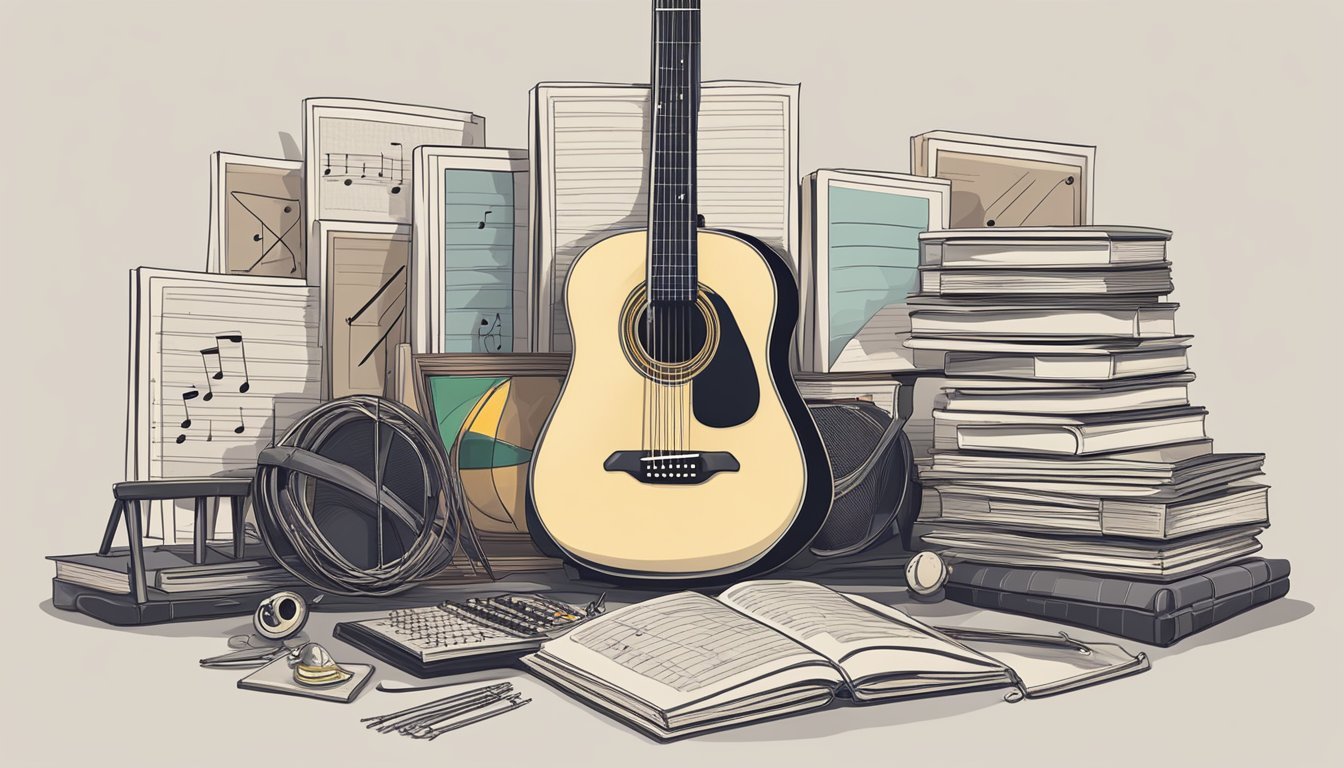Getting good at guitar isn’t just about hours spent practicing; it involves smart techniques and the right mindset. Set up a regular practice routine to help build your skills consistently and effectively. Whether you’re a beginner or looking to enhance your guitar playing, establishing good habits is crucial for progress.
You’ll find that even small, daily practices can lead to significant improvement over time.

As you explore ways to elevate your skills, consider using resources like online lessons and instructional videos.
They can provide valuable insights into mastering fundamentals and discovering new techniques.
Engaging with other musicians or joining a band can further enrich your journey, making learning fun and collaborative.
Key Takeaways
- A consistent practice routine is key to improvement.
- Online lessons can help you master guitar techniques.
- Playing with others enhances your skills and enjoyment.
Setting Up a Practice Routine
Having a solid practice routine is key to getting better at guitar.
It helps you build effective habits, stay organized, and track your progress.
Let’s break down how you can create a successful practice routine.
Establishing Effective Habits
Starting with good habits can make a big difference.
First, find a specific practice spot where you feel comfortable and focused.
Consistency is important, so try to practice at the same time each day.
Using a metronome can help improve your timing.
Start slow and gradually increase the speed as you get more comfortable.
Focus on short, focused sessions rather than long marathons.
Aim for 20 to 30 minutes of concentrated effort.
Mix technical exercises, like scales or finger drills, with fun songs you enjoy playing.
This balance keeps practice enjoyable and helps you stay motivated.
Crafting a Practice Schedule
Creating a practice schedule is a smart way to organize your time.
Start by setting clear goals.
Do you want to learn a new song, improve your chords, or work on solos? Write down what you want to achieve each week.
You might structure your practice like this:
- 5 minutes: Warm-up and stretching
- 10 minutes: Work on scales or chord changes
- 15 minutes: Focus on a specific song or technique
Using a calendar or a simple notebook can help.
Aim to stick to your schedule, but be flexible and adjust it as needed.
Consistency is more important than perfection.
Keeping a Practice Journal
A practice journal is a great tool for tracking your progress.
Write down what you worked on each day and any challenges you faced.
This helps you notice patterns over time.
Include details like:
- What exercises you practiced
- Songs you worked on
- Time spent on each activity
- What you want to focus on next session
Looking back at your journal can also boost motivation.
Seeing improvement over time shows that your efforts are paying off.
Plus, it helps you stay accountable and keeps you focused on your self-improvement goals.
Mastering Fundamentals and Techniques

Starting with the basics is key to getting good at guitar.
You want to build a strong foundation in chords, scales, and essential techniques.
Focusing on these areas will boost your skills and keep you motivated.
Learning Beginner Chords and Scales
Beginner chords are the first stepping stones in your guitar journey.
Start with major and minor open chords, often referred to as cowboy chords.
These chords include G, C, D, E, and A. Practice changing between them smoothly.
In addition to chords, getting familiar with scales is crucial.
The major scale is a great starting point.
Practice the C major scale up and down the neck.
This helps with finger placement and leads to better improvisation.
Make sure to play slowly at first, gradually increasing your speed.
Guitar Exercises and Drills
To build your guitar skills, you need regular practice.
Set up a routine that includes dedicated time for exercises.
Focus on your left-hand finger strength and dexterity.
Finger drills can make a huge difference in your playing.
Additionally, it’s beneficial to vary your practice sessions to keep things interesting and engaging.
Incorporate different styles of music and techniques to develop a well-rounded skill set.
For more effective learning, consider seeking out guitar practice tips for beginners that can provide valuable insights and methods to enhance your routine.
Try exercises like the chromatic scale to improve finger coordination.
Use a metronome to keep time and challenge yourself to play faster.
Another great drill is to practice arpeggios.
This helps with finger spacing and helps you play more complex pieces later on.
Improving Picking Technique
Your picking technique can make or break your playing.
Start with basic strumming patterns to develop rhythm.
Then, focus on alternate picking, where you switch between downstrokes and upstrokes.
This technique boosts speed and accuracy.
You can also try fingerstyle techniques where your fingers pluck the strings directly.
It helps you become more versatile.
Practice simple melodies using your fingers, and you’ll notice a difference.
Make sure to stay relaxed while playing; tension can hinder your technique.
Elevating Your Skills With Lessons and Resources
Improving your guitar skills is all about finding the right lessons and resources that suit your learning style.
Engaging with the right tools can help you stay motivated and advance your playing effectively.
Taking Guitar Lessons
Taking formal guitar lessons can really boost your skills.
A good teacher tailors lessons to your needs, whether you are a beginner or more advanced.
Look for instructors who encourage you to explore different styles, techniques, and songs.
In-person lessons offer immediate feedback, which is incredibly helpful.
You can also ask questions and address challenges in real-time.
If in-person doesn’t work, online lessons are a great option.
They provide flexibility and often include video tutorials.
When searching for lessons, consider platforms that offer structured programs.
These resources often include a mix of video lessons, practice exercises, and community support.
This balanced approach helps you stay engaged and accountable.
Utilizing Online Resources and Guitar News
The internet is packed with resources that can enhance your guitar journey.
Websites like National Guitar Academy provide helpful tips and guides for all skill levels.
You can find articles on everything from basic chords to advanced techniques.
Also, keep an eye on guitar news.
Staying updated on trends can inspire you and introduce you to new genres and musicians.
Joining forums and social media groups lets you connect with other players.
This can lead to sharing tips and experiences that can further your growth.
You might also find mobile apps designed for guitar practice.
These apps often include backing tracks, tuning tools, and lesson plans to guide your practice sessions.
Using a mix of these resources can keep your learning dynamic and enjoyable.
Frequently Asked Questions
Learning guitar can be full of questions.
Here are some common ones to help you navigate your journey and make progress.
What are some effective practice routines for beginner guitar players?
A good practice routine includes short, focused sessions.
Try to practice for 20-30 minutes daily.
Break it down into segments: warm-up, chords, scales, and a song.
This way, you can stay motivated and see improvement each time you play.
What’s the fastest way to improve my guitar skills?
The fastest way to improve is consistent practice.
Focus on specific techniques like strumming or fingerpicking.
Work on songs you love to keep things fun and interesting.
Learning in smaller chunks helps you build skills faster.
Can you suggest some exercises to enhance my guitar playing?
Sure! Start with finger exercises to build strength and dexterity.
Try practicing scales and chord changes.
You can also use a metronome to work on your timing.
These exercises will build a solid foundation for your playing.
What strategies can help with mastering guitar chords?
Practice each chord slowly, making sure your fingers are positioned correctly.
Use a chord chart to familiarize yourself with different shapes.
Transitioning between chords is key, so practice switching between a few chords repeatedly.
How much time is generally required to become proficient at guitar?
It varies, but with regular practice, you can see progress in a few months.
Typically, you’ll notice significant improvements after about six months to a year.
The more you play, the quicker you’ll improve.
Is it possible to teach yourself guitar, and if so, how?
Yes, you can definitely teach yourself guitar! Start by using online tutorials and video lessons.
Set realistic goals and track your progress.
Don’t forget to practice regularly and be patient with yourself as you learn.

